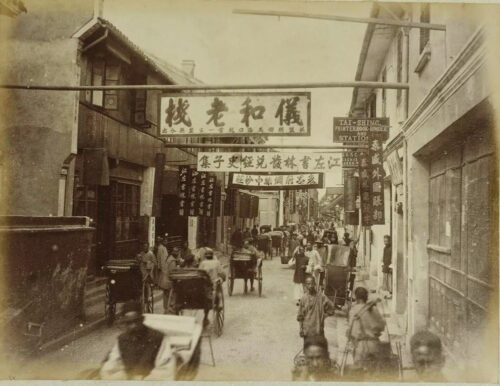The end of ShanghaiPRIDE? Organizers cancel all upcoming activities
China’s biggest festival celebrating LGBT+ life abruptly announced the suspension of all its activities. Chinese internet users suspect the government is to blame.

Organizers of ShanghaiPRIDE, the biggest festival in mainland China to honor diversity and amplify voices of the country’s LGBT+ community, said today that the remaining events for this year’s celebration had been called off and planning for future activities would be put on hold indefinitely.
In an abrupt announcement posted on the festival’s official WeChat page and website on August 13, the organizers wrote that they were “cancelling all upcoming activities and taking a break from scheduling any future events.” The announcement was titled, in English, “The end of the rainbow.”
“We love our community, and we are grateful for the experiences we’ve shared together. No matter what, we will always be proud — and you should be, too,” said the team behind ShanghaiPRIDE 2020.
The cancellation came as a surprise to many. As the longest-running Pride festival in the mainland, ShanghaiPRIDE, launched in 2009, served as a rare opportunity for LGBT+ groups to come together, celebrating their identity and raising awareness of issues affecting the LGBT+ community. Each year included a variety of events ranging from an annual film festival showing gay-themed titles to panels and workshops focusing on topics like inclusivity in the workplace and mental health issues.

Shanghai’s last Pride Run?
Despite the global COVID-19 pandemic, which caused the cancellation of more than 220 Pride celebrations around the world, the main celebration of this year’s ShanghaiPRIDE kicked off on June 13 with over 100 people participating in a Pride Run, the festival’s much quieter equivalent of the boisterous Pride parades that take place in many other countries. In the following week, with special COVID-19 prevention measures in place, a series of LGBT+-themed activities took place, including a job fair and several discussion forums.
According to an events calendar on the festival’s website, this year’s Pride celebration was supposed to run through December. Other notable activities scheduled for the rest of the year include a monthlong Pride Art exhibition that just opened last week and a gala to commemorate World AIDS Day on December 1.

So far, the organizers have not explained what caused the sudden cancellation, and why the festival had to take an indefinite hiatus. Co-founder Charlene Liu said that the decision was made to “protect the safety of all involved,” but did not specify a threat.
The ambiguity has sparked a storm of speculation on Chinese social media, with many pointing to the government as the most likely culprit behind the shutdown. “Obviously, it’s not due to the outbreak because it didn’t stop the festival from happening in the first place. In China, when something gets attacked abruptly, we know what’s up,” a Weibo user wrote.
Some also pointed out that concerns over “foreign influence in domestic affairs” might be part of the reason why the festival ran afoul of officials. According to its website, the festival “partnered” with a string of foreign consulates, including those of Australia, Britain, Denmark, and France.
According to a Douban user who said he was a volunteer at the festival in 2017, ShanghaiPRIDE has long been a target of Chinese officials who think such an event is at odds with the conservative beliefs endorsed by the government, which sees homosexuality as a threat to traditional family values essential to the nation’s identity, especially in a time when the country’s birth rates are in decline. “I heard that the organizers were summoned and interrogated by the government every year. They had to be extremely careful when it comes to media coverage and event planning,” the person wrote.
Although China decriminalized homosexuality in 1997, living in a truly accepting and inclusive society still remains a distant dream for the Chinese LGBT+ community. Same-sex marriage is yet to be recognized, and LGBT+ people still face widespread discrimination and significant challenges in the society.






